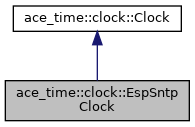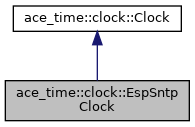An implementation of Clock that configures the built-in SNTP client on the ESP8266 and ESP32 using the configTime() function using UTC timezone (no STD or DST offset), and uses the C-library time() function as the reference clock.
More...
#include <EspSntpClock.h>


Public Member Functions | |
| bool | setup (const char *ntpServer=kDefaultNtpServer, uint32_t timeoutMillis=kDefaultTimeoutMillis) |
| Setup the SNTP client. More... | |
| acetime_t | getNow () const override |
| Return the number of seconds since the AceTime epoch (2000-01-01T00:00:00Z). More... | |
 Public Member Functions inherited from ace_time::clock::Clock Public Member Functions inherited from ace_time::clock::Clock | |
| Clock ()=default | |
| Default constructor. | |
| ~Clock ()=default | |
| We deliberately avoid using a virtual destructor. More... | |
| virtual void | sendRequest () const |
| Send a time request asynchronously. | |
| virtual bool | isResponseReady () const |
| Return true if a response is ready. | |
| virtual acetime_t | readResponse () const |
| Returns number of seconds since AceTime epoch (2000-01-01). More... | |
| virtual void | setNow (acetime_t) |
| Set the time to the indicated seconds. More... | |
Static Public Attributes | |
| static const char | kDefaultNtpServer [] = "pool.ntp.org" |
| Default NTP server, "pool.ntp.org". | |
| static const uint32_t | kDefaultTimeoutMillis = 15000 |
| Default time out for setup(). | |
 Static Public Attributes inherited from ace_time::clock::Clock Static Public Attributes inherited from ace_time::clock::Clock | |
| static const acetime_t | kInvalidSeconds = LocalTime::kInvalidSeconds |
| Error value returned by getNow() and other methods when this object is not yet initialized. | |
Detailed Description
An implementation of Clock that configures the built-in SNTP client on the ESP8266 and ESP32 using the configTime() function using UTC timezone (no STD or DST offset), and uses the C-library time() function as the reference clock.
Apparently the SNTP client synchronizes the time() every hour. This class depends on the WiFi client being configured somewhere else.
Definition at line 25 of file EspSntpClock.h.
Member Function Documentation
◆ getNow()
|
inlineoverridevirtual |
Return the number of seconds since the AceTime epoch (2000-01-01T00:00:00Z).
Returns kInvalidSeconds if an error has occured.
This is a blocking call. Some clocks (e.g. NTP client) this may take many seconds. On those clocks, use the asynchronous methods (sendRequest(), isResponseReady(), and readResponse()) instead.
Since acetime_t is a 32-bit integer, this method is valid if the current SNTP time() is within about +/- 68 years of the current epoch being used by the AceTime library, as defined by Epoch::currentEpochYear().
Implements ace_time::clock::Clock.
Definition at line 58 of file EspSntpClock.h.
◆ setup()
| bool ace_time::clock::EspSntpClock::setup | ( | const char * | ntpServer = kDefaultNtpServer, |
| uint32_t | timeoutMillis = kDefaultTimeoutMillis |
||
| ) |
Setup the SNTP client.
Assumes WiFi is already configured. This step can be skipped if the SNTP client is configured somewhere else.
- Parameters
-
ntpServer name of the NTP server, default "pool.ntp.org" timeoutMillis number of millis to wait before returning if the SNTP does not stabilize, default 15000 (15 seconds)
- Returns
- true if the setup() was successful, false if the timeout occurred
Definition at line 15 of file EspSntpClock.cpp.
The documentation for this class was generated from the following files:
- /home/brian/src/AceTimeClock/src/ace_time/clock/EspSntpClock.h
- /home/brian/src/AceTimeClock/src/ace_time/clock/EspSntpClock.cpp